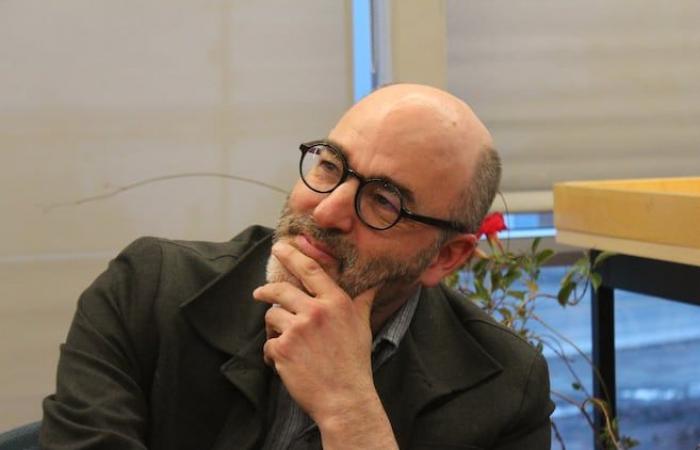Largely Quebecois, this Canadian tour began in Carleton-sur-Mer, a venue linked to the fact that Alain Deneault, who is accompanying this tour, lives relatively close to the Gaspé, since he is based in the Acadian Peninsula, in New Brunswick.
A renowned specialist in tax evasion issues, Mr. Deneault is interviewed in Yannick Kergoat’s documentary. He praises the film’s original approach.
“There have been many documentaries on tax evasion over the years. This one has the particularity of telling the story of the pseudo-struggle of states against tax evasion,” says the philosopher.
The data and historical context of the film are stunning. The tone is set from the first minute when we are immersed in the French demonstrations of November 2019, during which health workers denounce the lack of resources given to them by the State. November 2019 is the dawn of the pandemic.
We learn later in the documentary that France could recover between 80 and 100 billion euros per year in funds lost to tax evasion since the beginning of the decade. That’s roughly the equivalent of its health budget!
Broken Promises
The film quickly moves on to demonstrations of the mechanisms by which thousands of billions of euros and dollars are “leaked” by states for the benefit of the financial system.
Yannick Kergoat and Denis Robert, the other writer of the documentary, use the French case to demonstrate that we can easily go back to 1976 to see in the speeches of government leaders, presidents and ministers in particular, the gap between commitments to combat tax evasion on the one hand, and actions conferring advantages on large companies that undermine the public treasury on the other.
Passages from the historically more recent documentary illustrate how the commitments made by French President Nicolas Sarkozy at the G20 Summit on April 2, 2009 in London turned into damp squibs.
From a promise made to deliver a list of tax offenders, since a “list of shame” was needed, the countries of the Organization for Economic Cooperation and Development, the OECD, have crossed out the three little names that had initially been proposed. Result? A blank page!
Seven years later, on April 3, 2016, the Panama Papers would reveal huge lists of tax offenders, tens of thousands of names, as well as explanations of the role of law firms and tax specialists, such as Mossack Fonseca, specializing in tax avoidance.
The (very) great escape sheds light on the changes that have allowed tax evasion, largely based for generations on the secrecy of Swiss banks, to survive and even take on unsuspected proportions.
“Wealth is separated from its owners by creating shell companies,” the documentary summarizes. A single company or a single businessman can thus create dozens, sometimes hundreds of shell companies to make this dissociation concrete and open the door to tax evasion.
Permissive laws in several states, such as Ireland and Bermuda, provide “complementary” benefits to companies that allow for the easy, and often legal, transfer of huge sums of money. The film shows how multinational corporations use loopholes in the laws to relocate revenue streams to countries that are geographically distant from their operations and are tax havens.
This is how a company like Apple evaded 250 billion dollars in profits from the taxman in just a few years.
Elastic lists of delinquent countries, from which names are removed or added every three months, the total absence of sanctions on the part of the “authorities” mandated to draw up these lists, the practices of tax havens offering wealthy people the possibility of changing countries to avoid trouble, are all clear demonstrations illustrated in the film.
We see, thanks to the tireless work of journalists like Fabrice Arfi, from Mediapart, but also other reporters, countries offering rich people the possibility of quickly buying passports, or even changing their name!
Some government leaders who bring hope
The documentary makes you smile, sometimes bitterly, and it also brings a few glimmers of hope, if only through the lucidity of some government leaders.
One of them, British elected representative Margaret Hodge, deplores in her testimony that a facilitator, such as the firm Mossack Fonseca, gets away unscathed when one of its clients is fined for tax evasion.
Hodge laments that advocates for corporate fraud respond that legislators are responsible for tax evasion “because they write the laws. But governments don’t talk to tax fairness advocates when they write the laws.”
In the same vein, Alain Deneault points out that the current tax system, largely influenced by the needs of multinational firms, “creates a distortion of competition” because “SMEs pay a greater share of tax than the giants.”
On the subject of the legality of the tax system, the philosopher denounces the perception that “the law is the will of the gods, (because) it is transcendent. But this law is voted on.”
Along the same lines, Yannick Kergoat argues in the film that “nothing will change as long as elected officials depend on the rich.”
Exchanges with the public
After the screening, Alain Deneault had a long discussion with the Gaspé public. To Catherine Cyr-Wright, who asked him “how we change this culture,” the philosopher took a few minutes to emphasize that a point regularly overlooked by the financially privileged citizen who finds it legitimate not to pay taxes, “is that he owes his possibilities of enrichment to public infrastructures.”
Putting Elon Musk, the Desmarais, the Irving family and Amazon’s Jeff Bezos in the same bag, Mr. Deneault insisted on the need to emphasize local purchasing.
“If you buy a book at your local bookstore, the money stays here. If you buy it on Amazon, your money goes to Bermuda. At least we have some room to maneuver,” he sums up.
To Danielle Cyr, who finds that Yannick Kergoat did not talk about the role of shareholders of multinational companies in the whole tax issue, and who wonders “from what age” this education should begin, Alain Deneault also responded based on a rather dense preamble.
“I gave courses in Haiti to illiterate people in 2009, and they understood everything because they experience the injustices (resulting from tax evasion) in their flesh. A few days later, in Montreal, with people in higher education, I had great difficulty making them understand the same realities. Does this happen through courses? I’m not sure,” he says.
Alain Deneault believes that the collapse of the capitalist system, despite the formidable accumulation of wealth by its defenders, has already begun and that salvation lies in “a bio-regional perspective. We must prepare for the “after”, organize life on a regional scale.”
His next book, Do That! Political Engagement in the Age of the Unheardto be published on October 3, will answer, among other things, the question “What to do?” in the current context.






